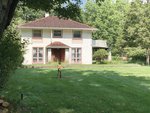
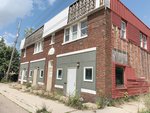
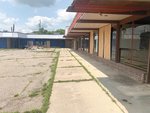
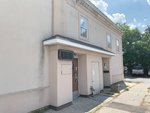
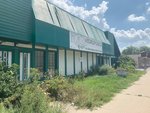
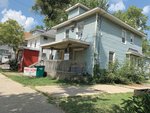
Sold signs on vacant land and renovations in action.
Landlords that give a damn and new business traction.
Corridor improvement and the investment it brings.
These are a few of Ingham County Treasurer Eric Schertzing’s favorite things.
And with more than 80 properties across Greater Lansing up for grabs at this week’s annual tax foreclosure auction, Schertzing is hopeful that would-be homeowners, landlords and commercial developers will seize a financial opportunity and help galvanize those favorite things into reality.
A total of 84 properties — comprising 73 bidding lots — will be up for grabs on Thursday (Aug. 26) at the Lansing Center for the county’s first in-person tax foreclosure auction since before the pandemic began. Last year’s auction was entirely virtual, with fewer than half as many properties in the catalogue.
This year, four commercial properties are for sale along with 45 homes and 24 vacant parcels. And with a cumulative minimum bid of more than $1.1 million, Schertzing anticipates their sale (and eventual redevelopment) will serve as a catalyst for future economic growth in Lansing.
“We do all sorts of things to prevent foreclosures. Foreclosures are never a good thing. But when they happen, the goal, as always, is to make a more significant impact in the communities where these properties are being sold, to help revitalize and build up these neighborhoods,” Schertzing said. “This year, I think we’ll see a lot of activity. It’s a real estate feeding frenzy.”
Landowners who fail to pay property taxes or special assessments are eventually forced to forfeit their property to the county Treasurer’s Office. For more than two years, officials will call and send letters to tax delinquent residents, hold public hearings and publish public notices.
Those who work to set up payment plans or show “some modicum” of financial responsibility can be granted leniency — especially if the foreclosure threatens to put a family on the street, Schertzing said. Most properties still unspoken for by March are sold to the highest bidder in August. Minimum bids are established, in part, on the amount of back taxes owed on the land.
Bankers and Realtors have long predicted the economic impact of the COVID-19 pandemic to lead to an eventual surge in foreclosures nationwide. Schertzing said that unemployment benefits, stimulus checks, forgivable loans and grants have helped prevent property owners from falling behind on their mortgage payments and taxes. Only 70 properties were foreclosed in 2020 — up from 56 in 2019, but a far cry from the 449 foreclosures Schertzing carried out in 2011 in the Great Recession.
“When the federal stimulus checks came out, we saw payments come in. There was definitely a connection between unemployment benefits, stimulus checks and our office getting paid,” Schertzing said. “We had a huge crest of activity from the recession, but it has essentially been improving each and every year since. Now, again, we seem to be hitting some sort of plateau.”
Schertzing projects foreclosure rates to climb as much as 50% over the next two years, sending more and more local property back onto the market. The benefits dam can only hold for so long.
“Everyone who has got more time is not going to be successful,” he added. “Somewhere, you have to conceive coming out of this pandemic response. A number of people who are delinquent have been given more time, and they’re going to find themselves even deeper in the mud than they were two or three years ago. Maybe they’ll get lucky. Maybe there will be recovery dollars in the pipeline for these people. But unfortunately, it can be expensive to owe money to the Treasurer’s Office and that cost will bury some people too deep for recovery.”
An average of 176 properties have been foreclosed annually in the county over the last 16 years, but those rates are skewed by a large spike tracked in the wake of the Great Recession.
A total of more than 500 foreclosures were tracked in 2009 and 2010, followed by the all-time annual high of 449 in 2011. Those rates (except this year) have been on a steady decline, county records showed.
“It would be pretty hard for somebody to not see this coming,” Schertzing said. “Even before the pandemic, if people were working with us and getting financial counseling, we’ve been giving extra time for the folks who want it and need it. At some point, the process does take over.”
This year’s auction catalogue includes a diverse array of land from all quadrants of the city of Lansing, as well as a few properties in East Lansing, Okemos and other neighboring townships. Like in most years, foreclosures are concentrated in neighborhoods directly adjacent to I-496.
Schertzing said about 70% of the land consists of “rundown properties” that are wholly defined by redlining, the now-illegal practice of refusing loans in certain areas of the city based on race.
Between 1963 and 1970, close to 890 families in Lansing received letters from the state demanding they relocate for the I-496 construction project, which took 35 years to finish and displaced several thousand residents of once-thriving ethnic communities in the city of Lansing.
“That historic discrimination against properties and people really outlines a lot of the areas where we spend a lot of our time,” Schertzing said. “It’s always very consistent over time, and a lot of our foreclosures are truly defined by the redlining maps that have discriminated on mortgages.”
With low interest rates and a relatively narrow inventory of available real estate in Lansing, Schertzing said interest in this year’s auction is uncharacteristically high. He expects up to 100 buyers to register for the auction — with some parcels selling for six times their reserve price.
“Auction prices have strengthened considerably. We also have plenty of new buyers coming out of the woodwork daily. What that means exactly, I think, is yet to be seen,” Schertzing said.
The lot with the most expensive minimum bid of about $59,000 includes a shopping plaza on the corner of Washington and Miller roads in south Lansing, the former home of Binni’s Bar and Grill. Other big-ticket parcels include a 5,800-square-foot commercial space on Saginaw Street and the former Gus’s Bar & Grill, 2321 W. Michigan Ave., a working-class watering hole that closed its doors in 2018.
Also up for grabs is the former CC Greenery (and H20 Hydroponics) in downtown Okemos, once owned by James Sinadinos, a local all-star high school and college wrestler-turned-coach.
This reporter visited at least a third of the properties last week, most are in shabby condition, with boarded-up windows or overgrown shrubs. Six of the homes have been ordered demolished.
Still, Schertzing said he spots plenty of opportunities for those with the vision to pursue them.
And when the pandemic strikes, when unemployment climbs, when Schertzing is feeling sad, he simply remembers his favorite things and then hopes Greater Lansing doesn’t feel so bad.
“The auction can really be a fascinating room,” Schertzing said. “We’re talking about people with visions of a better future for these spaces who can often end up making a huge difference in the community by taking a real risk on a property, testing their skills and abilities and hopefully then turning an unloved property into something that looks and feels like it’s truly being loved again.”
Here’s a closer look at some of the properties featured in this week’s foreclosure auction:
This commercial building on the corner of Quaker Court and Saginaw Access Road was owned by Sunshine REO Management LLC and was foreclosed last July. It’s about 5,800 square feet, was built in 1929 and remodeled in 1989 with a handicap accessible bathroom and small office space off the main room, records showed. An old sale listing labeled it as a block-and-brick structure that is “as solid as they come” with wide open spaces for “anything you can imagine.”
Lot 3306: 820 W. Miller Ave. in Lansing — Minimum Bid: $58,833.64This unkempt plaza was the subject of more than 50 emergency calls in under two years, which pushed local cops to label Binni’s Bar and Grill a “nuisance” property in 2018. The Michigan Liquor Control Commission also revoked its license following a long history of violations.
Among the issues: Someone was shot there on New Year’s Day in 2017. Another incident left a man with a bullet in his leg. Other calls included robbery and assault. Former owner Love Singh threw in the towel in 2018 and stopped paying property taxes, eventually triggering foreclosure.
In total, the site includes more than 12,000 square feet of retail, restaurant, market and laundromat space. The new owner will have to spend time replacing shattered windows and boarded-up doors, scrubbing off spray paint, repairing siding and repaving the entire parking lot.
Despite the poor reputation, Schertzing hopes new development will revitalize the space.
“I think someone with a foodie bend or someone who can actually put some time in that building will find success,” Schertzing said. “I think that building and that location — with the right ownership — could really begin a transformation of that whole area. It’s a busy intersection.”
Lot 3303: 2321 W. Michigan Ave. in Lansing — Minimum Bid: $15,531.80This 4,900-square-foot commercial building was built in 1948 on the corner of Michigan Avenue and Hungerford Street, just northwest of Saint Joseph Park. Attached to an operating liquor store, it’s also the former site of Gus’s Bar & Grill. Former owner and Greek immigrant Gus Caliacatsos, who came to the United States in 1962, decided to open the blue-collar bar in 1982. A nearby automotive assembly plant closed in 2005 and took most of his customers, leading him to sell the bar in 2008 and retire to Greece. He returned in 2010 after the buyer stopped making payments. It closed in 2018.
Lot 3302: 4708 Okemos Rd. — Minimum Bid: $38,703.50Schertzing said he expects this downtown Okemos parcel could fetch up to $300,000 on the open market and will be sure to garner bids far behind the initial reserve price of about $39,000.
Among those expected to put in an offer: The property’s most recent owner and all-star wrestler, James Sinadinos, 88, who wants to reclaim a building that his family has owned for decades.
James Sinadinos’ son Andrew Sinadinos told City Pulse that his father’s short-term memory is “shot to shit” and that he somehow didn’t realize that property taxes were being left unpaid until after the land had already been foreclosed. Despite pleading with Schertzing’s office for a second chance to reclaim the property, the parcel will still be included in this week’s auction.
“I’m disappointed because my father is a freaking great guy — a really caring guy who has been in this community for his whole life. He’s a two-time state champion. He has worked with United Way. And just because he didn’t see the paperwork, his shit is being forfeited,” Andrew Sinadinos said, noting that he and his father hired an attorney to help sort out his concerns.
A last-minute legal compromise led to Schertzing’s pulling one of Sinadinos’ other properties from the auction last week, namely because he didn’t want to displace a local family that was renting the place. The former site of the CC Greenery, however, will still be up for grabs at the auction.
“We’ve bent over backwards here to keep a roof over somebody’s head. I think that’s where the community, the public, the taxpayers, the voters want to see things go. We’ve built some flexibility into the process but you cannot have infinite flexibility,” Schertzing explained.
He added: “The people that put up a fight are not the poor people living in older neighborhoods in blighted properties. The $40,000 house doesn’t call me up. The $250,000 commercial property, however, will try to run a full-scale media assault. It does get a little old.”
Lot 3304: 512 & 514 W. Oakland Ave. — Minimum Bid $23,336.03These adjacent multi-residential homes are situated between Pine and Chestnut streets. Schertzing said he cobbled them together into one bidding lot in hopes that a one motivated buyer will scoop them both up for a more significant (and lucrative) neighborhood investment.
It’s the same strategy associated with several lots that include multiple parcels in the catalogue.
“We’re auctioning them off together because some private buyer is better off, for various reasons, owning them as one to maximize their income on those lots,” Schertzing said. “That’s a tough area for development, even with the Hall of Justice across the street. That eastern edge of the West Side Neighborhood has had its challenges, so we really need a couple owners to come in with a grander vision for that corridor, as well as on Martin Luther King Jr. Boulevard.”
The Ingham County Land Bank, which under Schertzing’s leadership was established in 2005, receives whatever property is left over from the foreclosure process. Schertzing, its founding chairman, sits on its board of directors and has worked to put those properties back onto local tax rolls and into productive uses in local neighborhoods.
Its inventory includes over 600 vacant lots. The website also lists three residential homes for sale, as well as four commercial properties. Schertzing said several foreclosed properties are also situated near existing Land Bank properties to further maximize development potential.
“Just selling that corner house is not nearly as powerful of a move as selling that corner house and the lot next door. With some properties, you can pretty much control an entire city block,” he said. “Who knows what some of these will become in five, 10 or maybe 20 years down the line?”
Support City Pulse - Donate Today!
Comments
No comments on this item Please log in to comment by clicking here